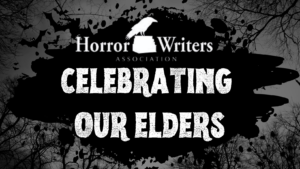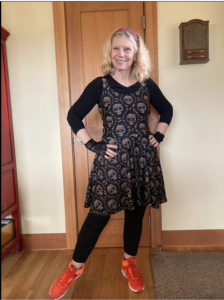Celebrating Our Elders: Interview with Nancy Holder

 Nancy Holder is the former vice president and former board member of HWA. She is New York Times bestselling author of over a hundred book-length projects and hundreds of short stories, essays, and articles. She has received 7 Bram Stoker Awards including the Lifetime Achievement Award from the Horror Writers Association and was named Faust Grand Master from the International Association of Media Tie-In Writers. She is known for writing material for Buffy the Vampire Slayer and other intellectual properties, as well as novelizing movies such as Wonder Woman and Crimson Peak. She taught in the Stonecoast MFA in Creative Writing program offered through the University of Southern Maine for thirteen years, and many of her students have gone on to high-profile publishing success. She has been “investitured” [sic] as a Baker Street Irregular and an Adventuress of Sherlock Holmes. She is currently writing the forthcoming supernatural comics They Call Me Midnight and Johnny Fade and pulp fiction with Alan Philipson.
Nancy Holder is the former vice president and former board member of HWA. She is New York Times bestselling author of over a hundred book-length projects and hundreds of short stories, essays, and articles. She has received 7 Bram Stoker Awards including the Lifetime Achievement Award from the Horror Writers Association and was named Faust Grand Master from the International Association of Media Tie-In Writers. She is known for writing material for Buffy the Vampire Slayer and other intellectual properties, as well as novelizing movies such as Wonder Woman and Crimson Peak. She taught in the Stonecoast MFA in Creative Writing program offered through the University of Southern Maine for thirteen years, and many of her students have gone on to high-profile publishing success. She has been “investitured” [sic] as a Baker Street Irregular and an Adventuress of Sherlock Holmes. She is currently writing the forthcoming supernatural comics They Call Me Midnight and Johnny Fade and pulp fiction with Alan Philipson.
Did you start out writing or working in the horror field, and if so why? If not, what were you writing initially and what compelled you to move into horror?
I started out in romances. I wrote and sold them easily, and they were lots of fun. The Romance Writers of America offered amazing classes and education and a Big Sister-Little Sister program to help newer writers. I learned so much from being in RWA. But after a while, I realized I was immersed in horror. My bookshelf was packed with what I used to call “books with black covers.” I had all the Tor books with the orange pumpkins and the classic Tor title font and the kids with glowing eyes. I bought books at 7-Eleven; I called them “deadly puppet novels.” I had a moment of truth about switching genres. My then-agent cautioned me that I wouldn’t make as much money as I would stay in romance. He was right!
Who were your influences as a writer when you started out and who, if anyone, continues to influence you?
I adored Shirley Jackson and still do. Edgar Allan Poe. My girl, Mary Shelley. Stephen King. And my mentor, Charles L. Grant. Charlie was the king of quiet, literate horror. Arthur Conan Doyle is a current influence. His story “The Captain of the ‘Pole-star’” is so haunting and weird. He invented the mummy genre as we know it, with “Lot 249” and “The Ring of Thoth.” Karloff’s The Mummy is an amalgam of these two stories. There’s more to Doyle than Sherlock Holmes.
How have the changes in horror publishing over the past decades affected you?
The field is more diverse not only in terms of other writers but other forms, such as novellas and graphic novels. In King’s Danse Macabre, he talked about writing novellas and what a godforsaken enterprise it was. He described starting one as a bandido chirruping, “Welcome to novella, señor!”
I’m glad writers—at least the writers I know—have stopped being so competitive with each other. There’s a lot of helping each other, offering advice, sharing markets. Being kind, for God’s sake. I lay that down to our most recent HWA presidents: Rocky Wood, Lisa Morton, John Palisano, and John Edward Lawson.
I love working with and knowing so many women writers. I’m so proud to be an honorary Black Crane—I’m referring to the “Black Crane” movement featuring prominent Asian woman writers such as my editors, Lee Murray and Geneve Flynn, and editors Angela Yuriko Smith and Christina Sng. It’s astonishing to look at the amazing tables of contents they have compiled in their joint and individual projects. When the boat rises, it rises for all of us. My friend the poet Linda Addison speaks to many writer’s hearts with such compassion. Jeani Rector of The Horror Zine works tirelessly. Ellen Datlow, Paula Guran, and Lisa Morton have expanded the playing field as well with dedication and commitment.
I’m glad publishing is not so New York-centric anymore. One of my publishers, IFWG Publishing/IPI Comics, is based in Australia.
Do you think you’ve encountered ageism? If so, how do you counteract or deal with it?
Well, the only time I’ve been referred to as “an older writer” was for this interview, I say chuckling. Perhaps “seasoned writer” would have pinched a little less. I wonder on occasion if I’ve been aged out of something I used to write for a lot (a franchise, for example), or if the editors simply wanted new voices. Hard to say.
What do you wish you knew when you were just getting into the field?
It’s really, really okay to write part-time. On a number of occasions, I thought about going back to school to become educated in a profession aside from freelance writing. I enrolled in grad school twice. Dropped out twice. I think my life would have been a lot less stressful if I had had a gig bundled with health insurance, sick days, and so forth. The flipside is that I wouldn’t have been as prolific. But I wouldn’t have had to be as prolific.
Do you have any advice for writers just starting out?
See above. Live well below your means. If you are struggling financially, don’t close your eyes and cross your fingers that you’ll make a sale. Build up a cushion. My heart breaks for all the writers forced to pay for health care and bills via GoFundMe. Especially health care. Our country can be very unkind. Why on earth don’t we want to help each other thrive on this planet?
Take a dispassionate look at how your career is trending. I remember the late, great William Relling, who talked about the seeming randomness of careers—how come that guy got a book deal? Why did they option that woman’s short story for a TV series? He imagined that writers are like chess pieces on a board; a light is positioned above us, moving randomly. It may stop above you, singling you out. But that can only happen if you stay on the board.
Muy importante—move! Exercise as best you can. After I broke my toe, I did wheelchair aerobics and weightlifting. Writers sit so much. We need to take care of our bodies.
Do you think older characters are represented fairly and honestly in horror fiction?
I haven’t really noticed, to be honest. It’s not something I look at/think about much. There’s a term in literary criticism called “the unmarked state.” It refers to a character who has been given no description; their description will be filled in by default in the mind of the reader. Thanks in large part to the narrative style prevalent in nineteenth-century fiction), this “unmarked” character has traditionally been a white male in his thirties. This trope has started to fade, at first due to gamers experimenting with “othering” themselves when creating their player characters. There’s a fascinating discussion of this in My Avatar, Myself: Identity in Video Role-Playing Games (James Gee, McFarland & Company, 2009). Writing the Other by Cynthia Ward and Nisi Shawl (Aqueduct, 2005) takes a deep dive into how writers can expand the unmarked state. As this implies readers (gamers) no longer assume an undescribed character is thirty and may instead see someone older, I think that’s fantastic. (My thanks to Sumiko Saulson and Ellen Datlow for helping me clarify this point.)
That in itself is exciting, whether it pertains to horror exclusively or literature/narratives in general.
What are some of your favorite portrayals of older characters?
The men in Peter Straub’s Ghost Story. I felt a great deal of empathy for them. A mistake made in youth haunts them for the rest of their lives.
Do you have anything you’d like to add that we haven’t asked?
It doesn’t cost anything to be kind and professional. Assertive, yes. Rude, no.
For many years, I compartmentalized my life. Everything had its own box, including writing. Parts of my life existed in parallel. I didn’t know how to let them all be the same life. But that’s what it all is: life. Live your life. Breathe in experiences, breathe out words.




OH MY GOD! How could I neglect to mention our own Kathy Ptacek, who edited groundbreaking showcase anthologies of horror by women horror writers? Women of Darkness! And my dear, departed Melissa Mia Hall, who anthologized Wild Women. Apologies to both, esp. “the Gila Queen,” who works tirelessly to promote all us horror folks.